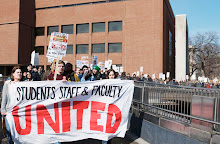Since Daily Planet reporter Molly Priesmeyer broke the story on September 15, university officials have scrambled to get their story straight about why Karen Himle, Vice President of University Relations, canceled the premiere of "Troubled Waters," a documentary about the Mississippi. Among other things, it examines the impact of current modes of agricultural production on the health of our waterways. Given the influence of big ag in Minnesota, one wonders if it was fear of a negative reaction by the ag industry that led university officials to pull the plug.
But of course university officials won't say that. After the story was picked up by other media outlets, university officials were having a difficult time getting their story straight. Himle has refused to talk to the press, but she indicated in communications with some parties that the film was pulled to review its scientific content. So the U's pretty boy media relations director Dan Wolter was left holding the bag. First he said that he was unsure why the film was pulled but that the Bell Museum had done so because it needed further scientific review. But Bell's associate director of communications, Martin Moen, said that Himle pulled it but that he couldn't say why. University of Minnesota scientists who participated in the making of the documentary are not commenting publicly, but the director of the film, Larkin McPhee, is puzzled. Winner of numerous prestigious awards for her films, McPhee says that the film underwent extensive fact checking by university scientists.
The game of hot potato finally ended today when the Dean of CFANS, Al Levine, finally talked to reporters. According to Levine, "Troubled Waters" was postponed because it "vilifies agriculture." Apparently the film has too much drama for him and unfairly targets agricultural pollution, since it considers agriculture's role in water pollution before discussing other sources of pollution. ""Agriculture is a major contributor to these issues, we know that," he said, noting the film takes a half-hour to talk about other sources of runoff, such as cities or lawn chemicals." He does not dispute the film's accurancy but its balance, and according to him, the film should have presented views by scientists who concentrate on the need to increase agricultural production to feed 9 billion people by 2050.
Perhaps Dean Levine should resign as Dean and become a documentary film maker. University officials have once again shown themselves to be the gang that can't shoot straight. In hopes of quietly squelching a film that highlights the major role that agriculture plays in polluting our waterways--a FACT that nobody disputes--they have created a media frenzy that not only assures that the film will be widely viewed if it is released, but also makes the University look like a sell-out to industry. The University denies that there was external pressure (read: big ag). And that is probably true. The saddest part of this story is that it looks like university officials pulled the film preemptively in order to avoid complaints from industry. Industry influence runs so deep that they can exert power without lifting a finger. The mere possibility that industry will reduce its funding of research at the U leads our top officials to compromise our academic integrity.
Saturday, September 18, 2010
Subscribe to:
Post Comments (Atom)


No comments:
Post a Comment